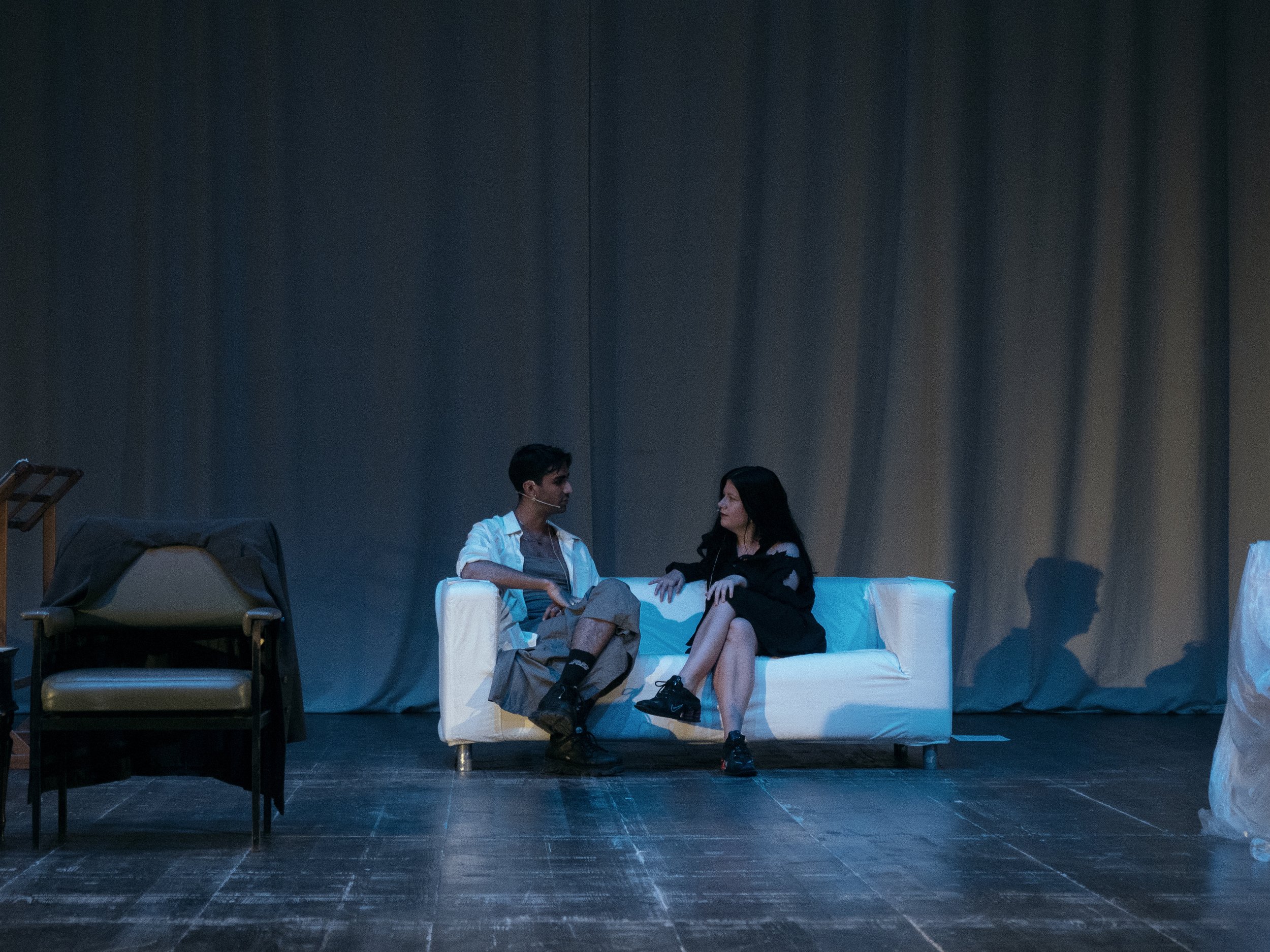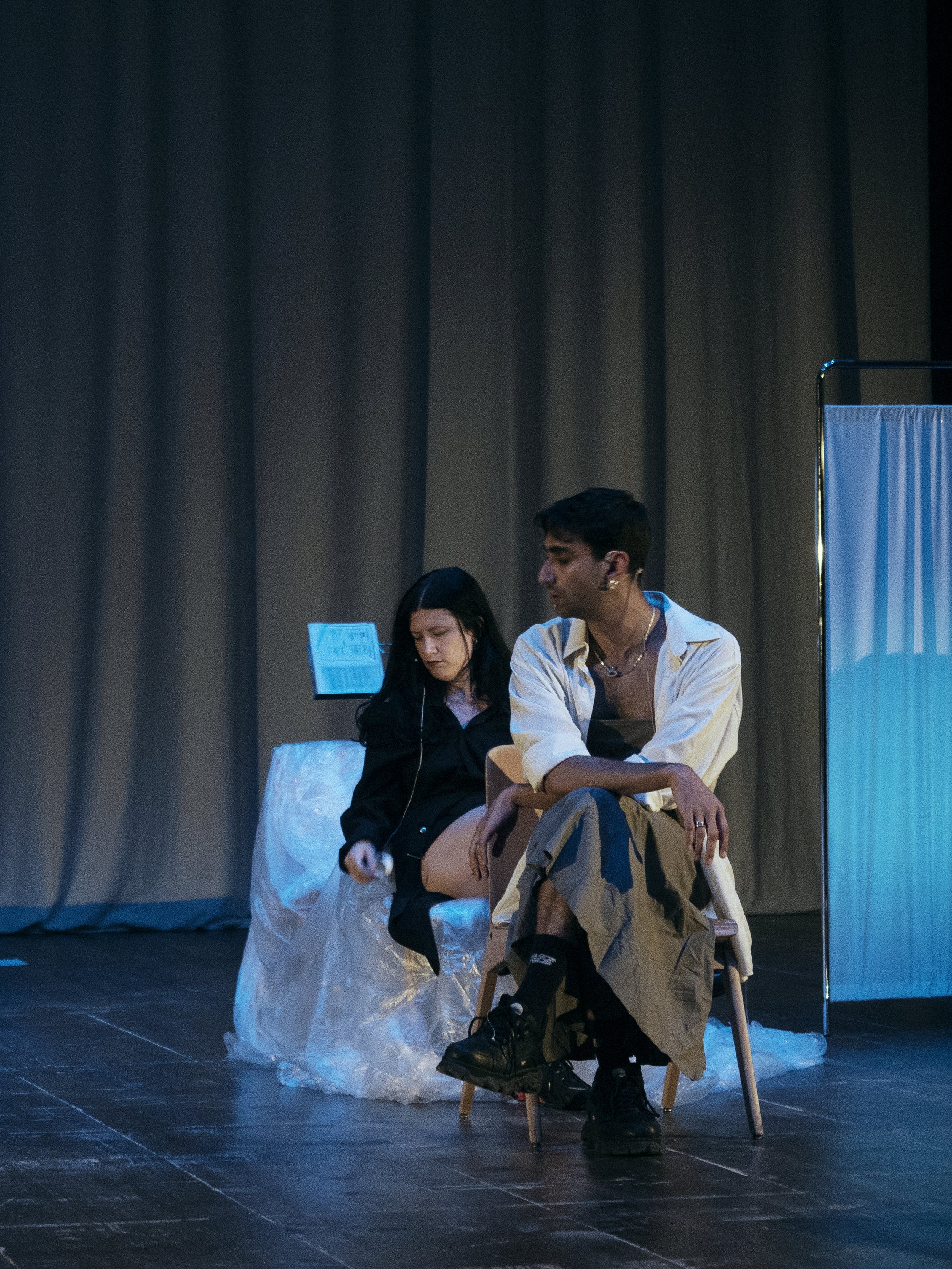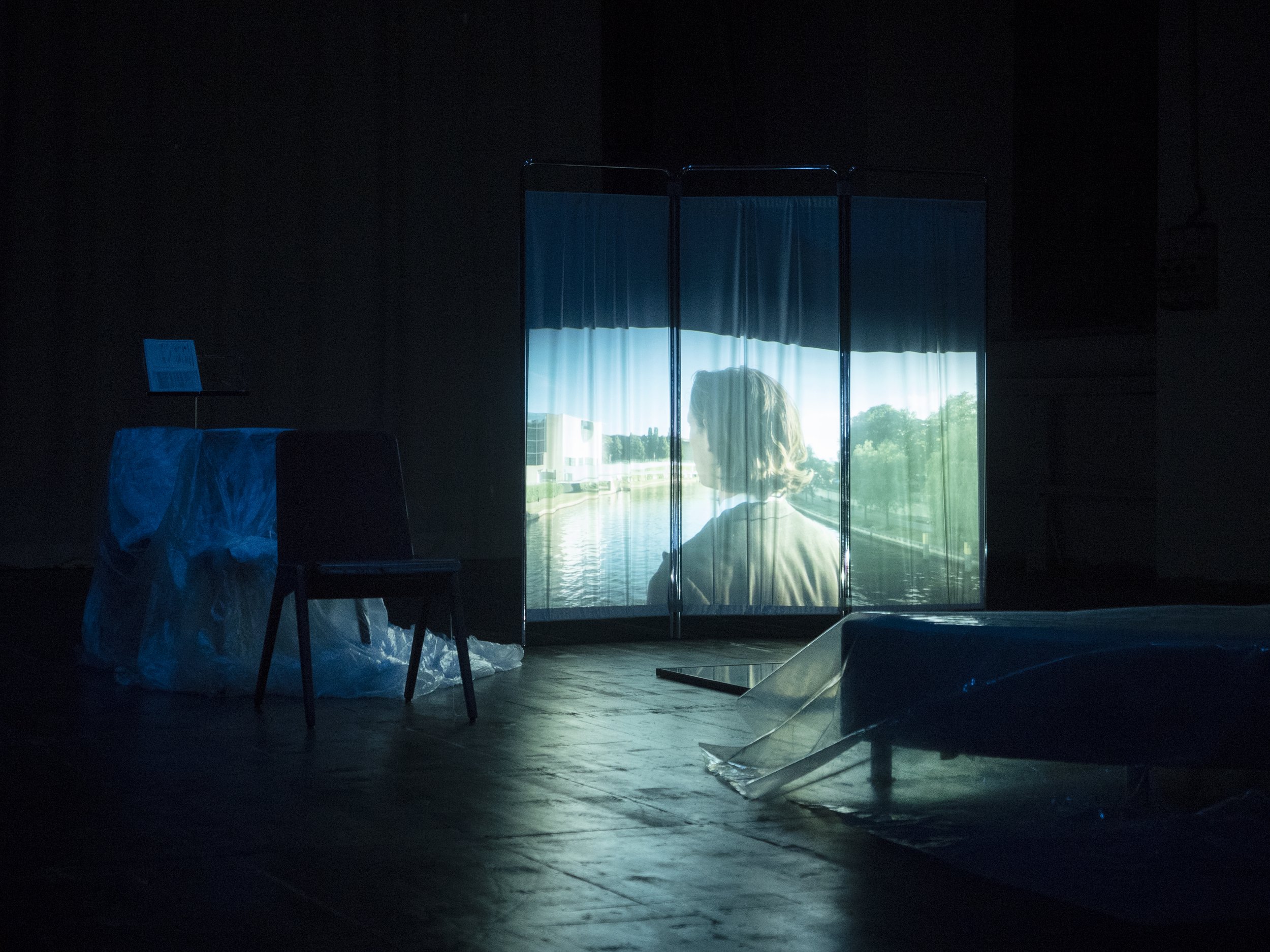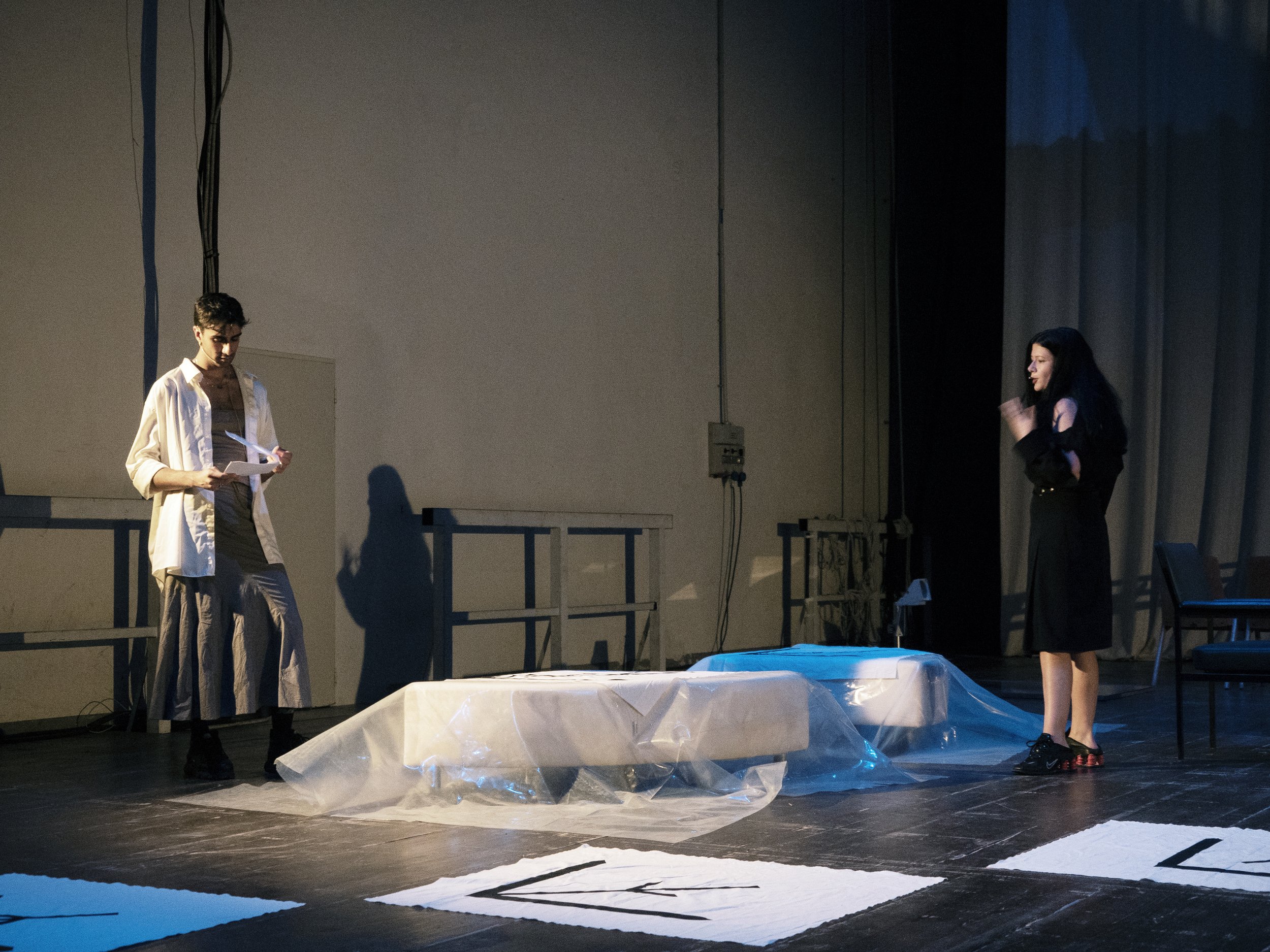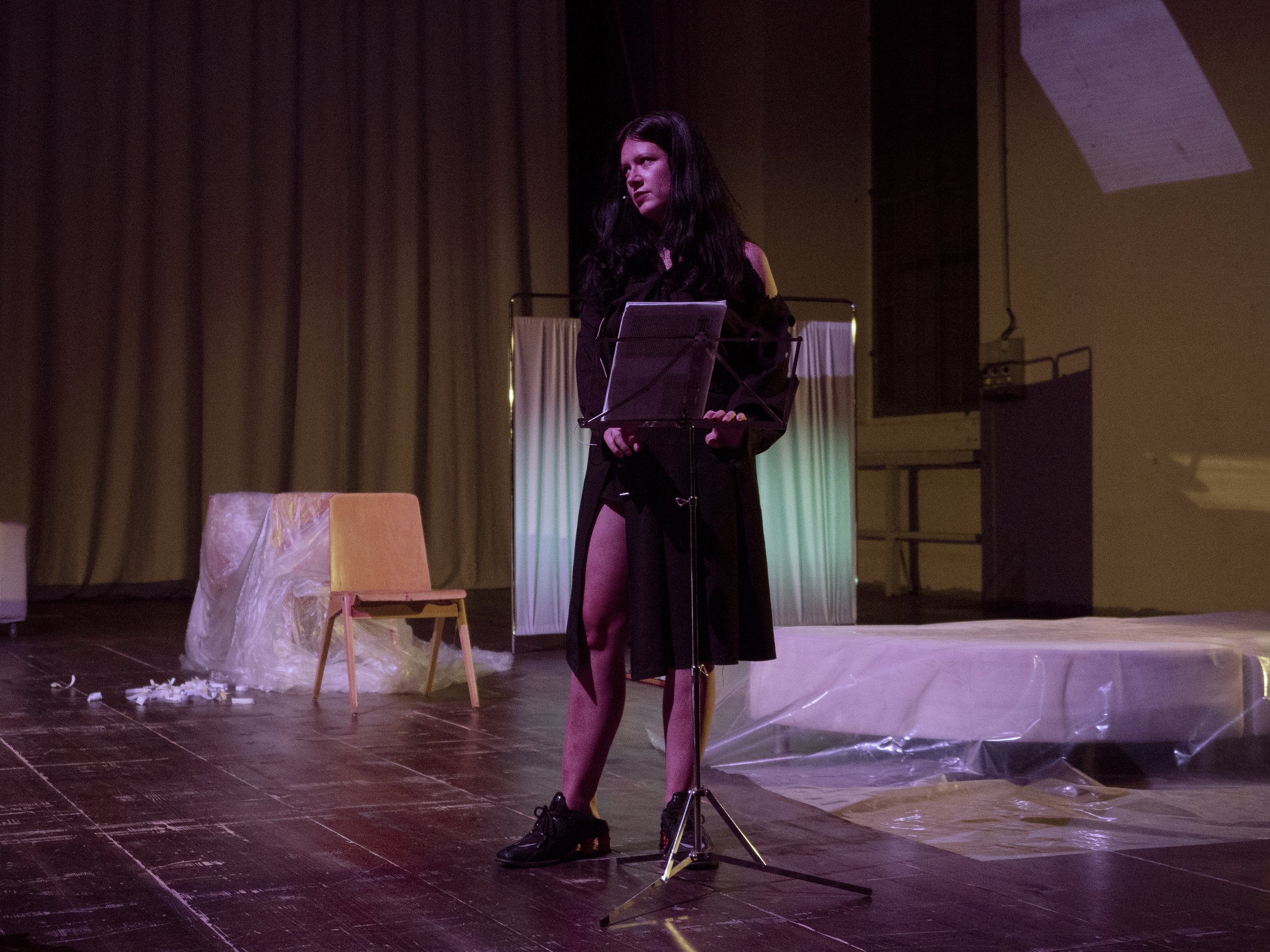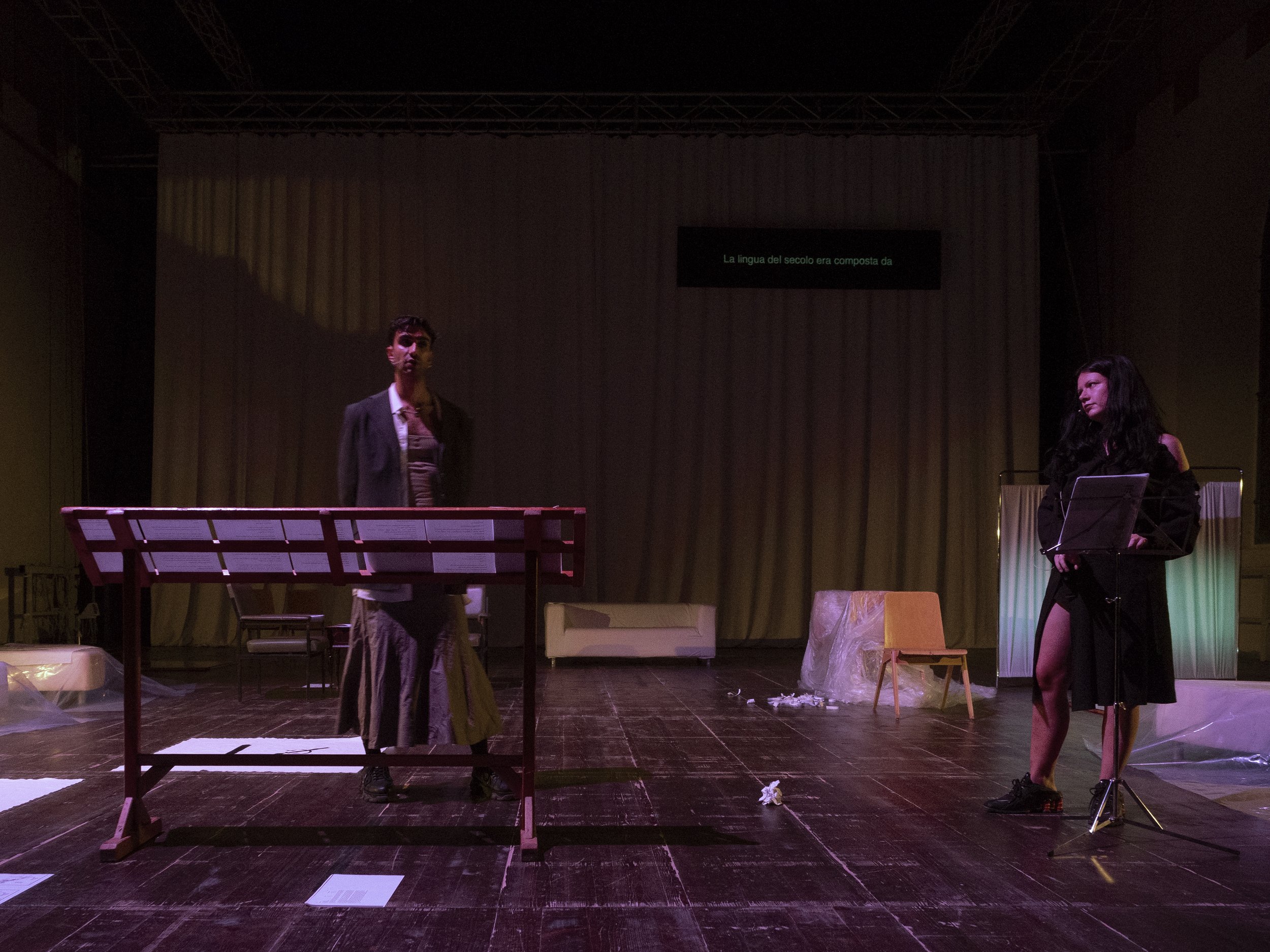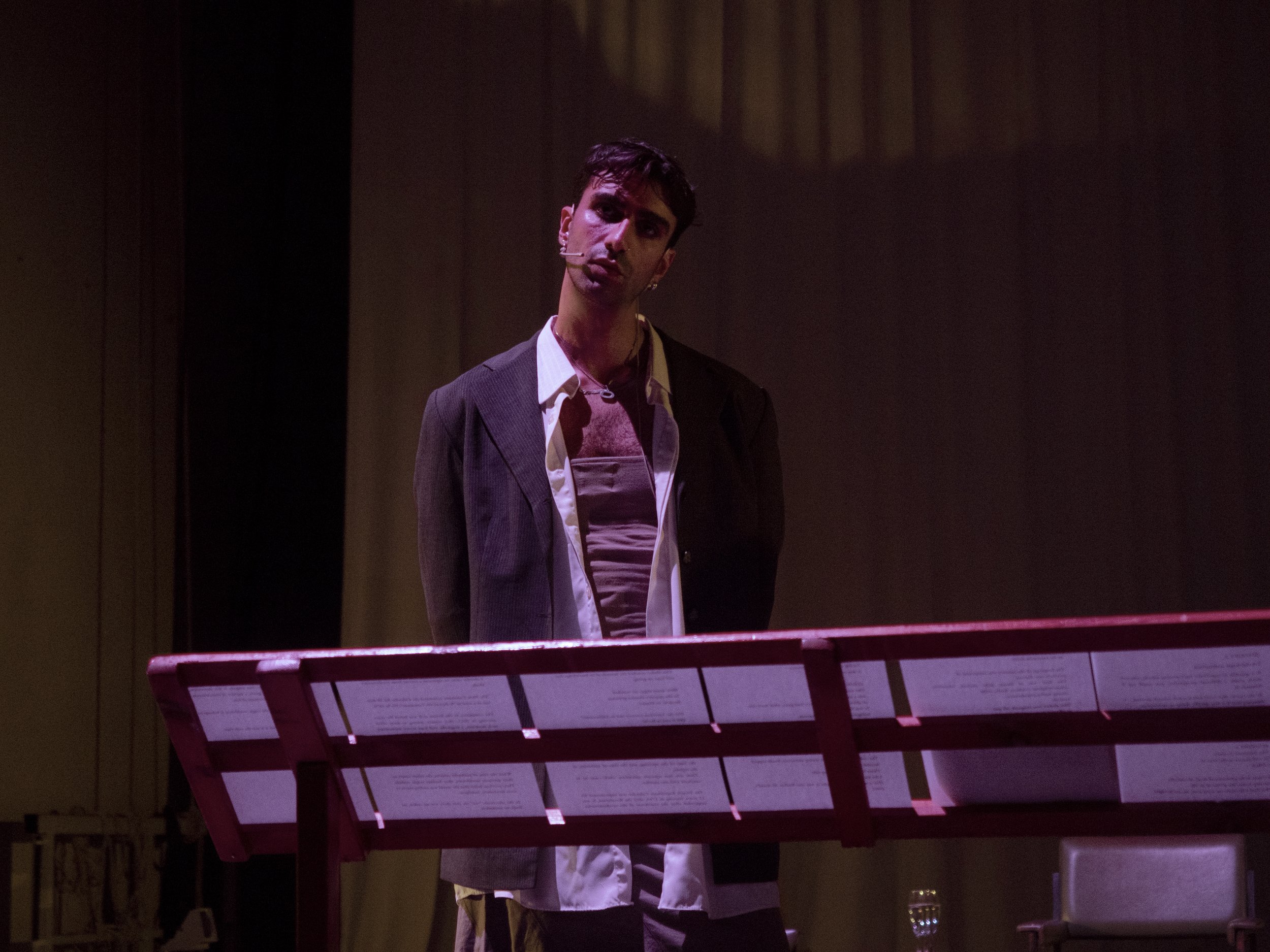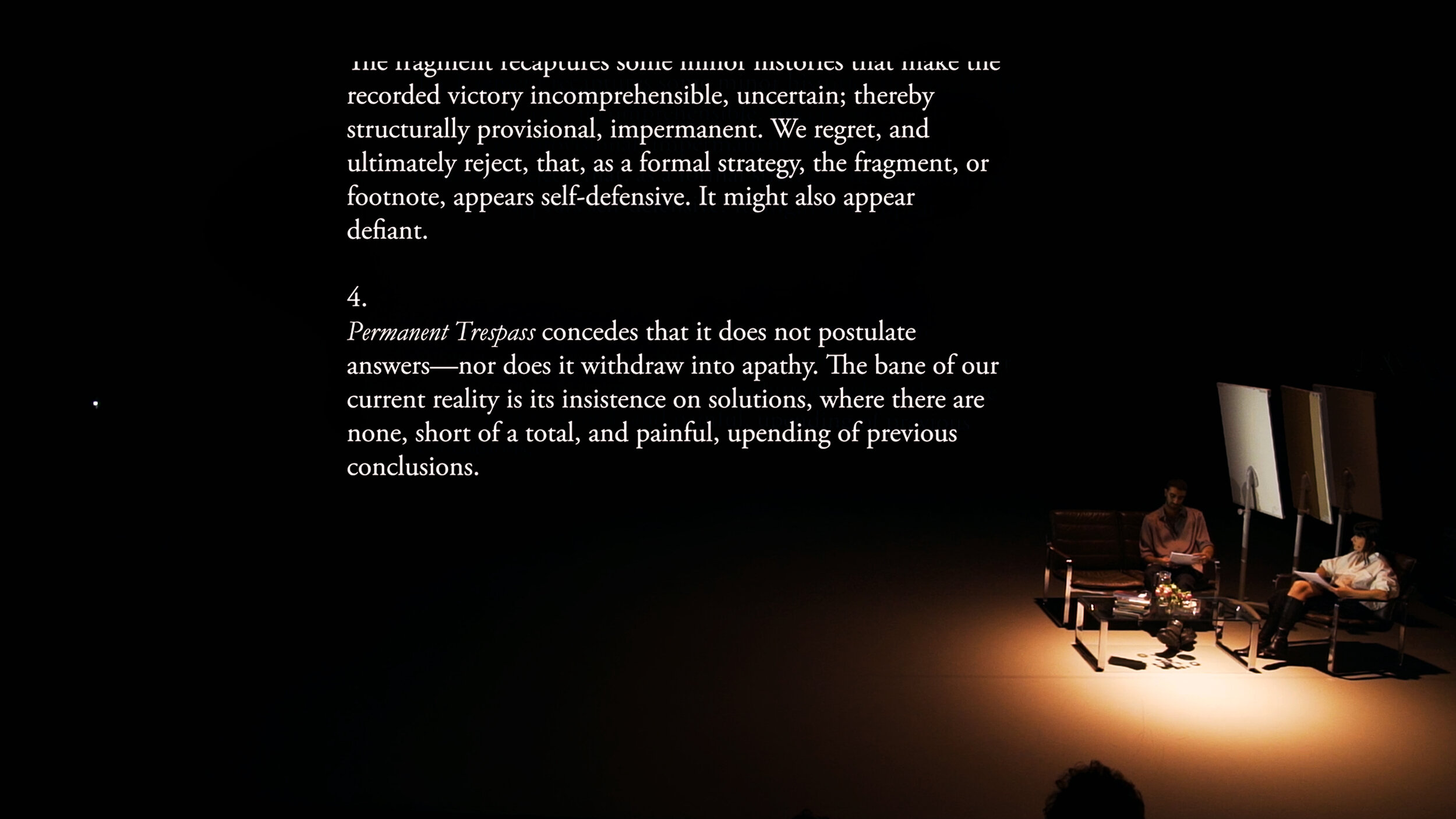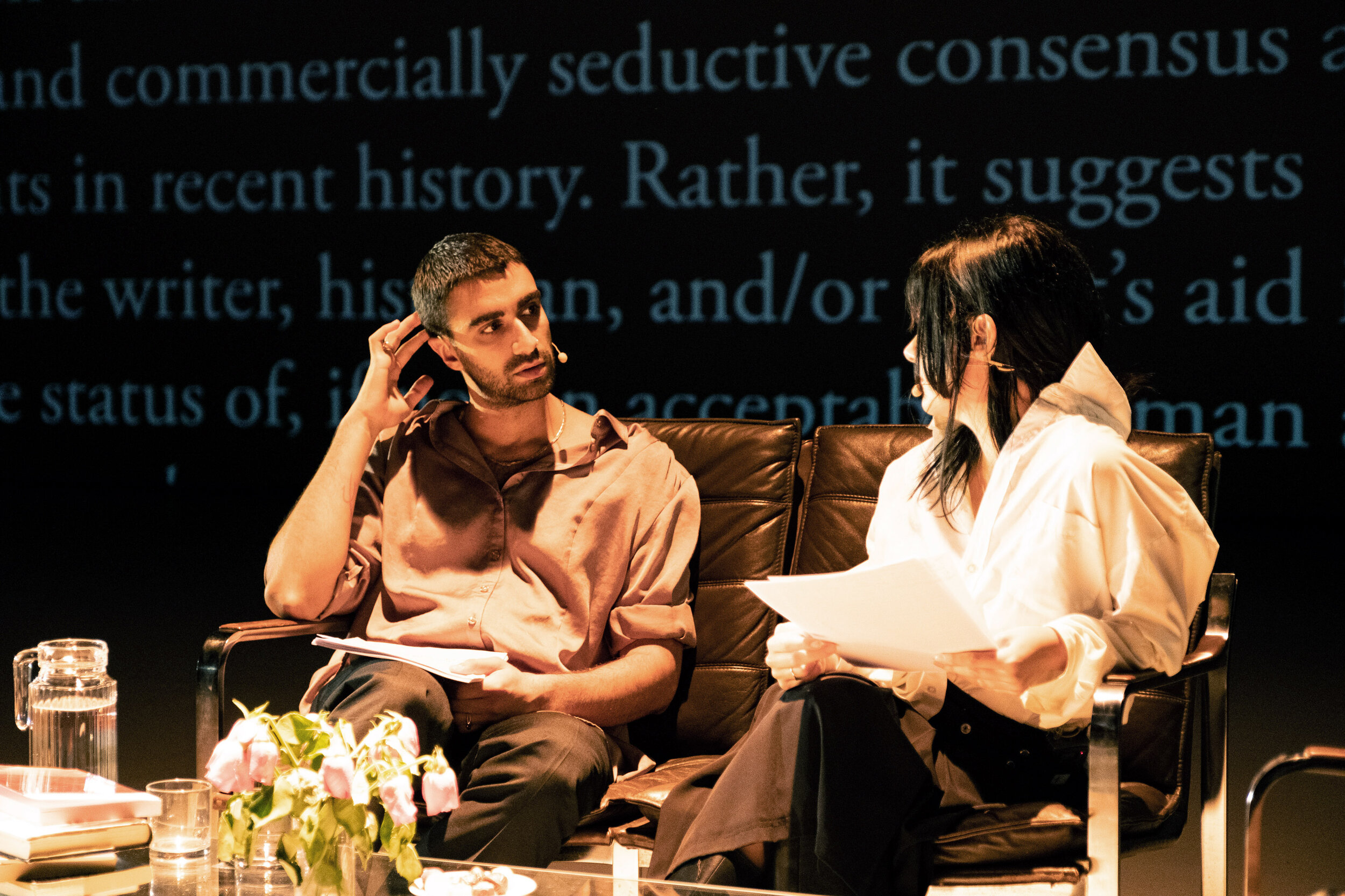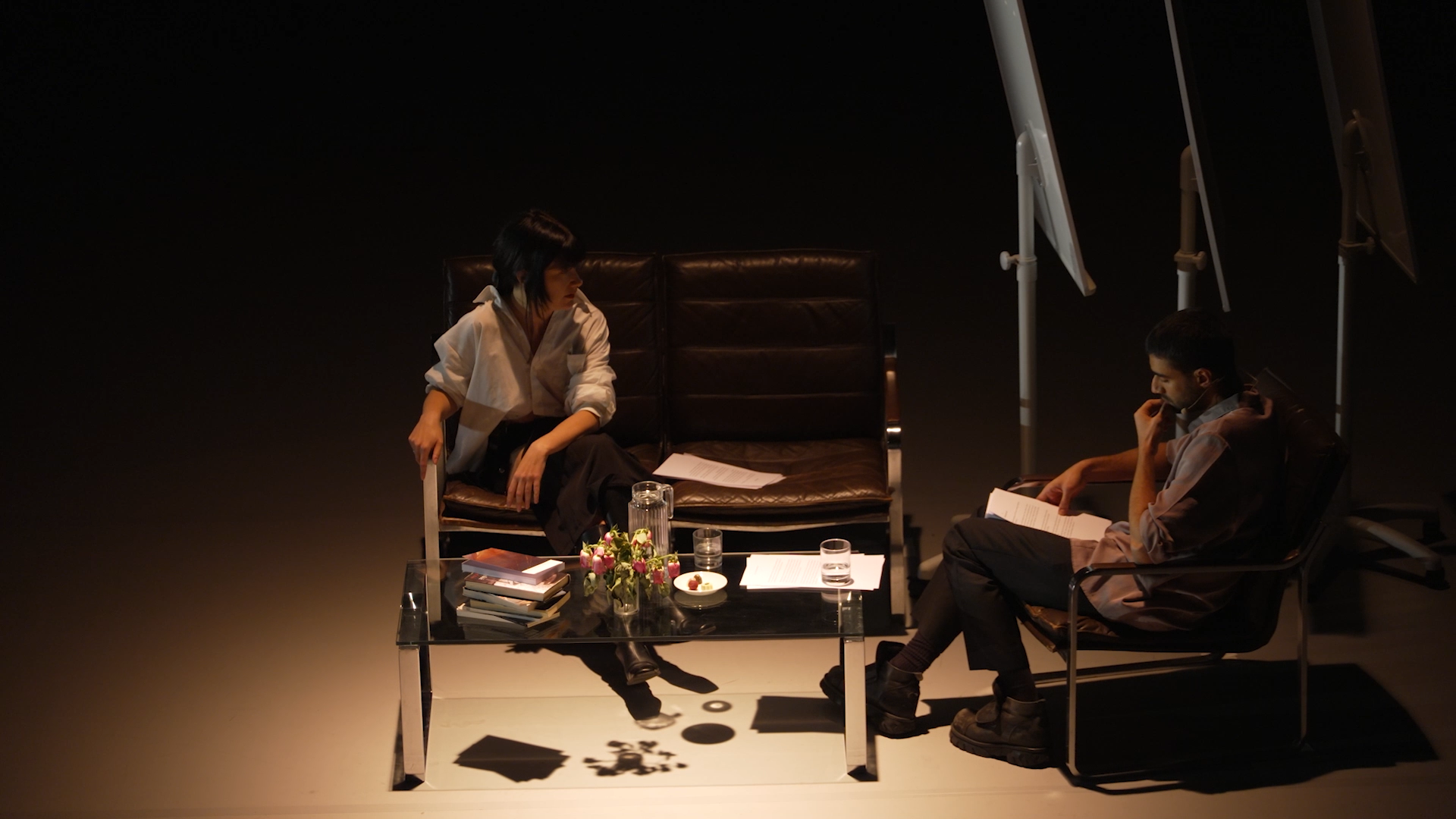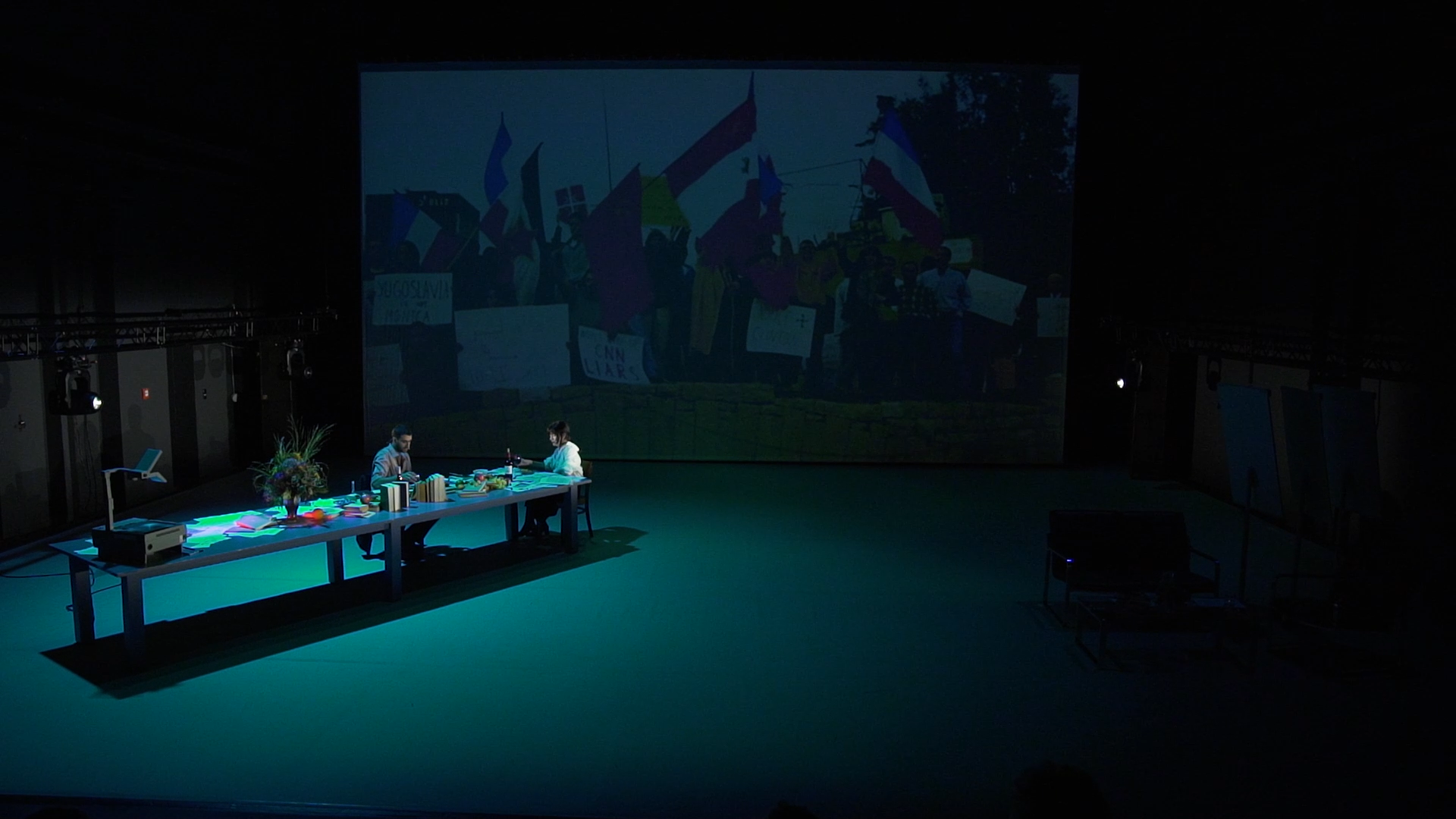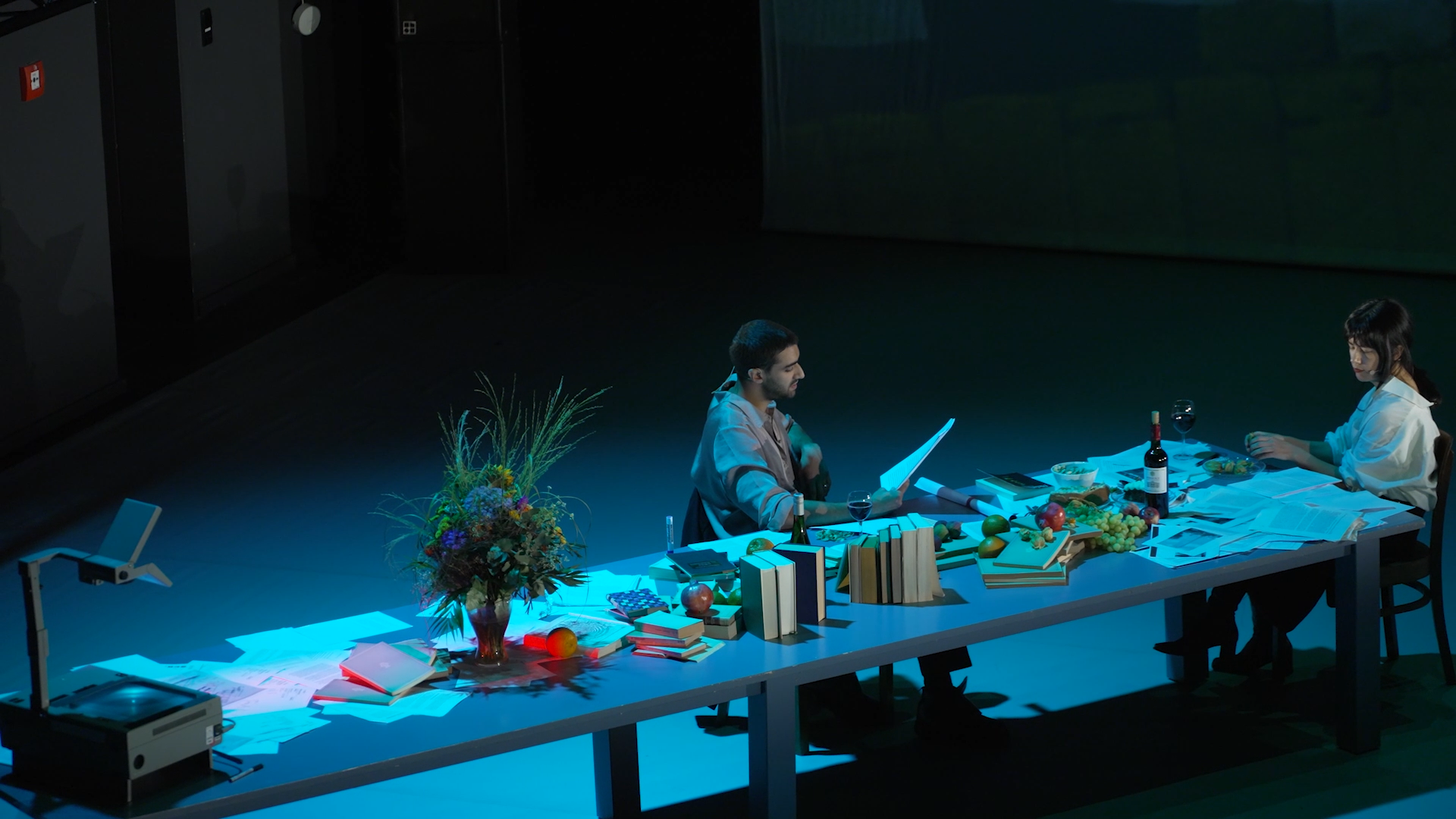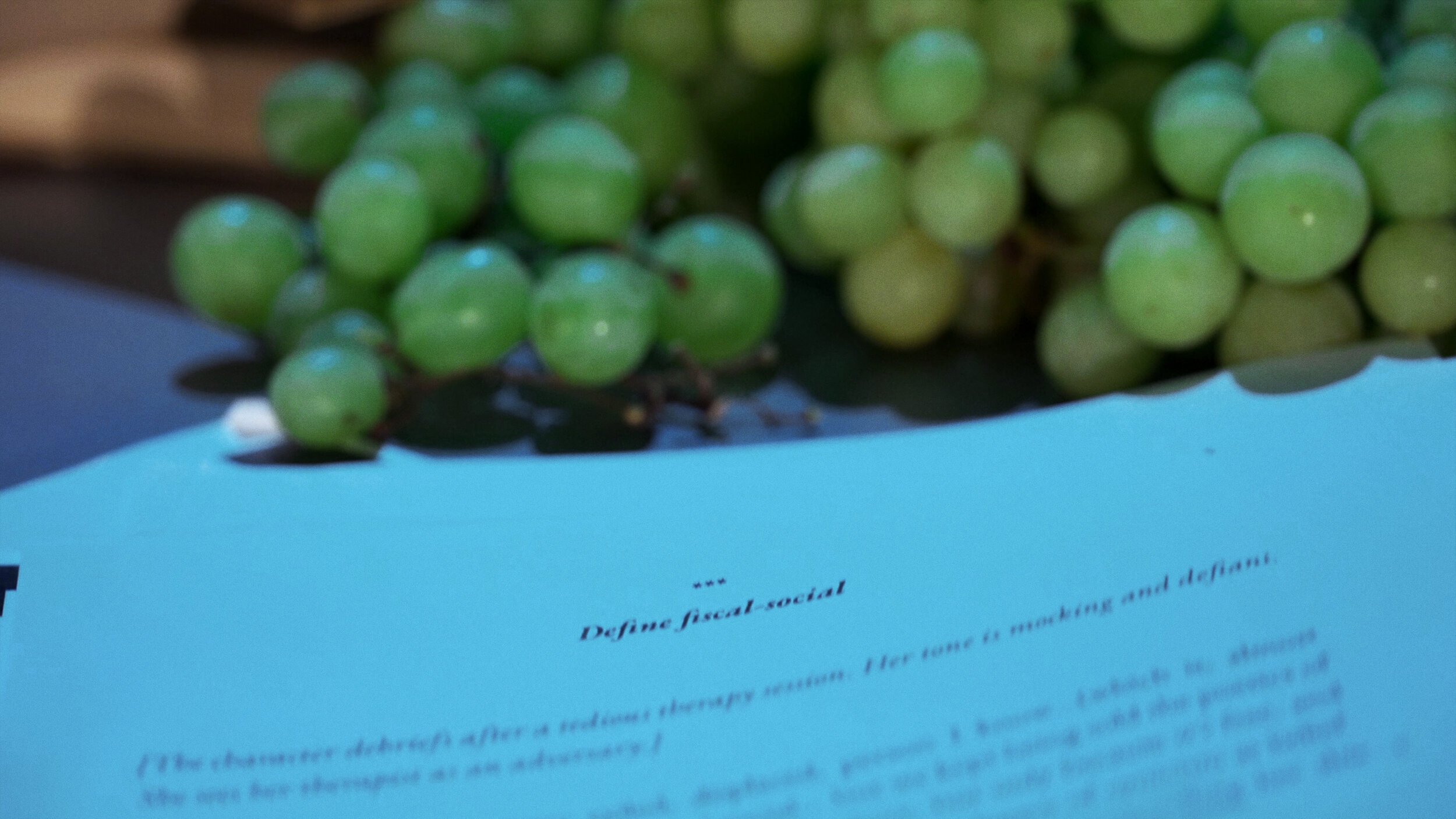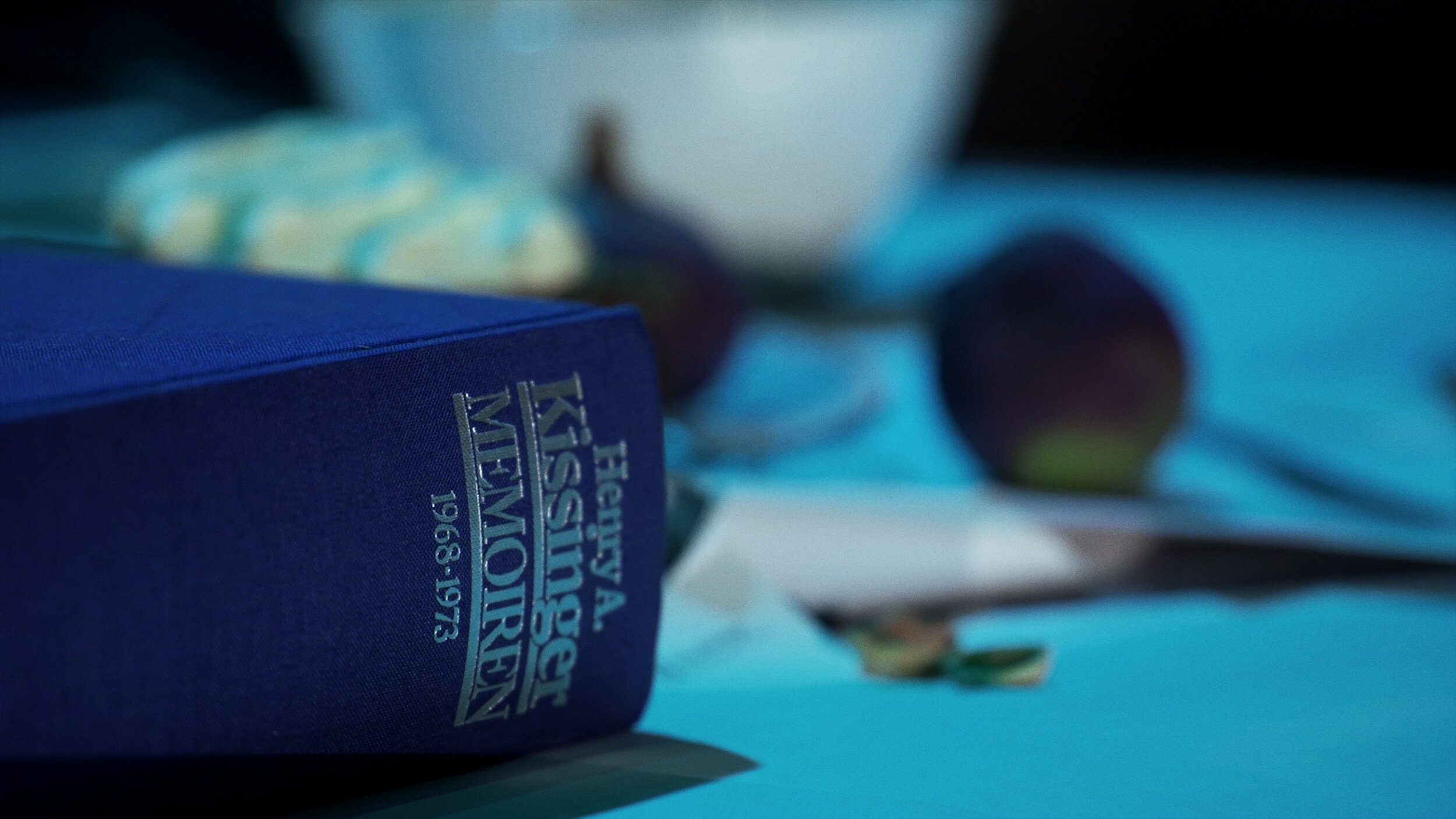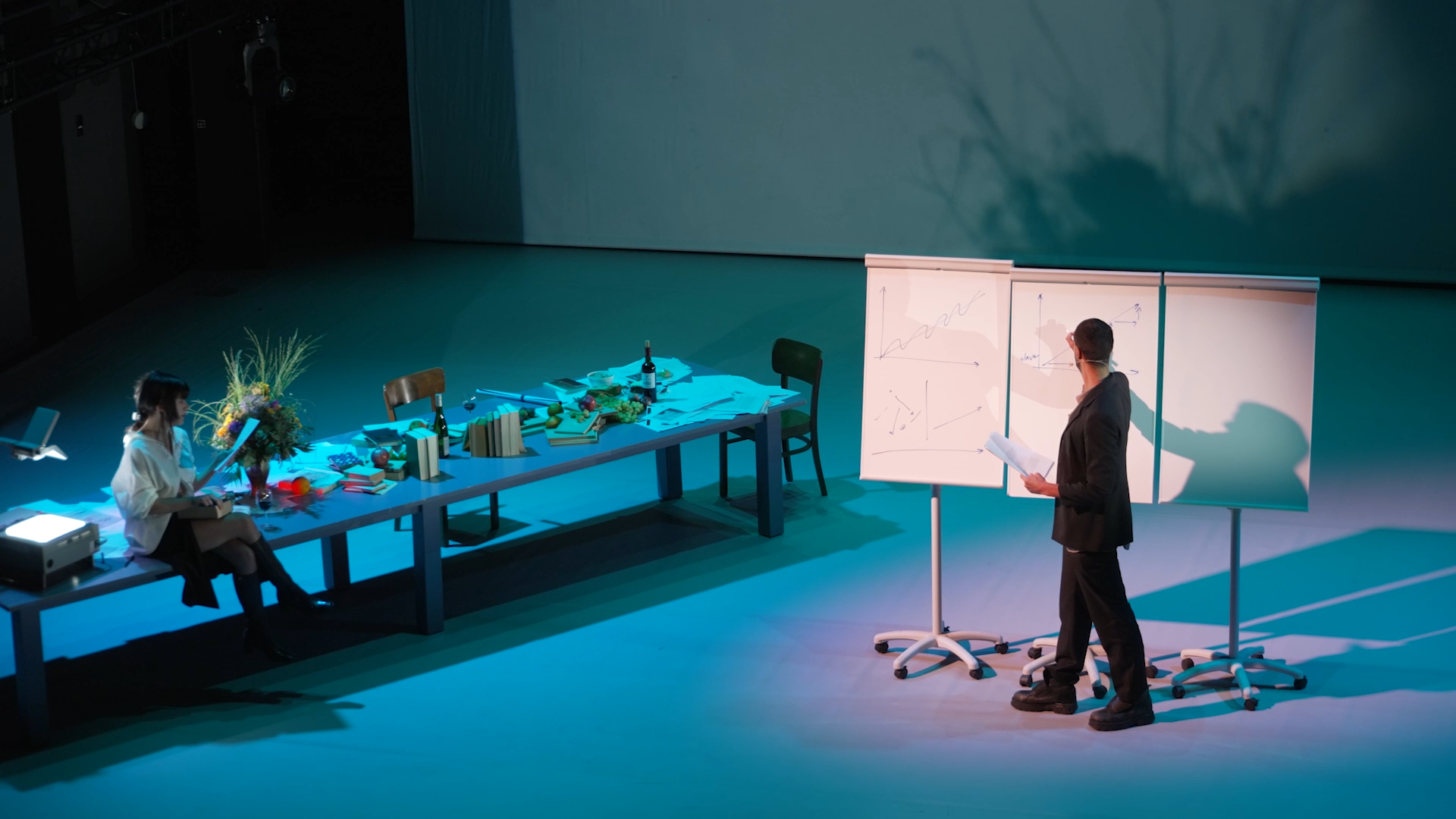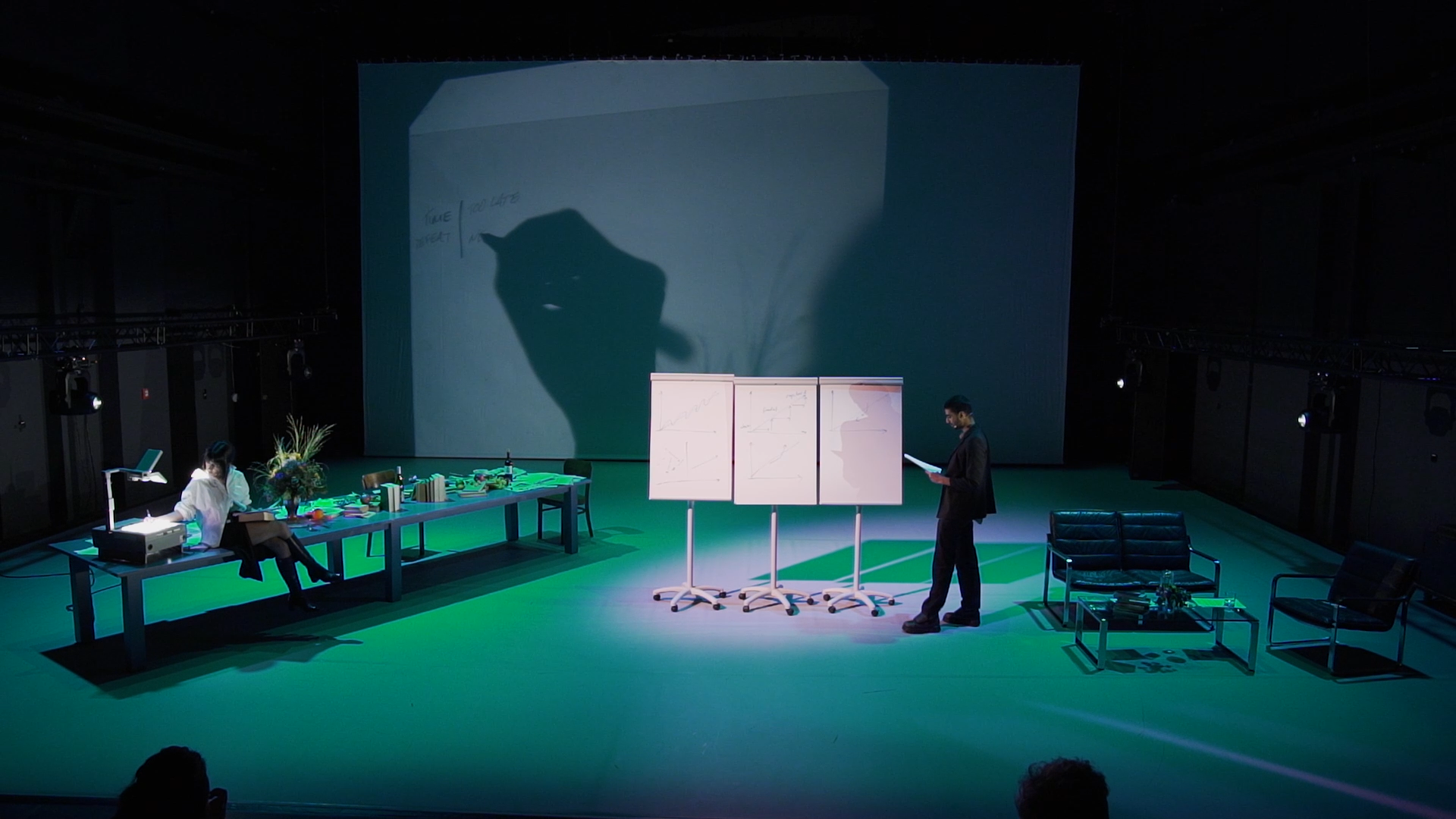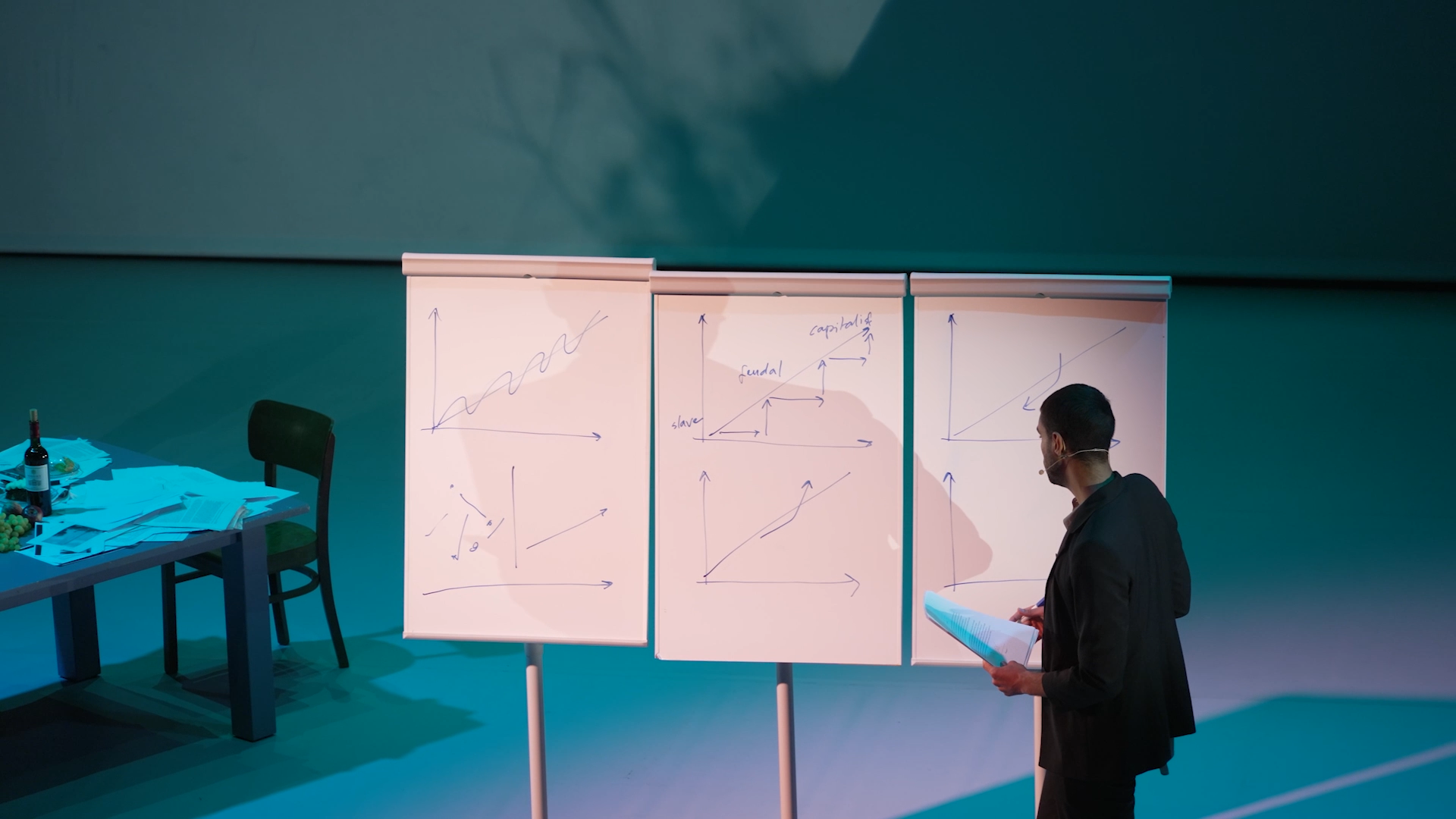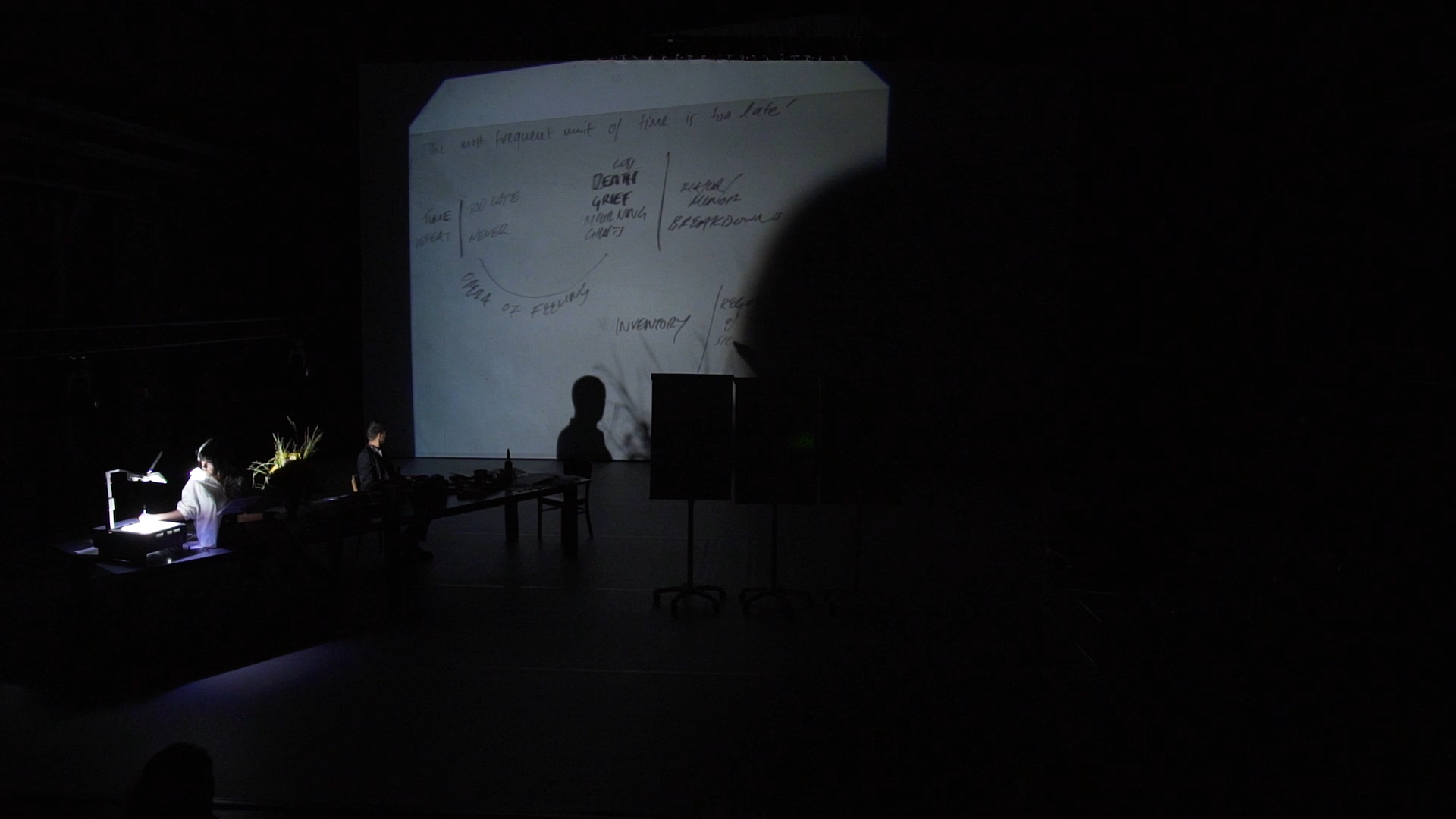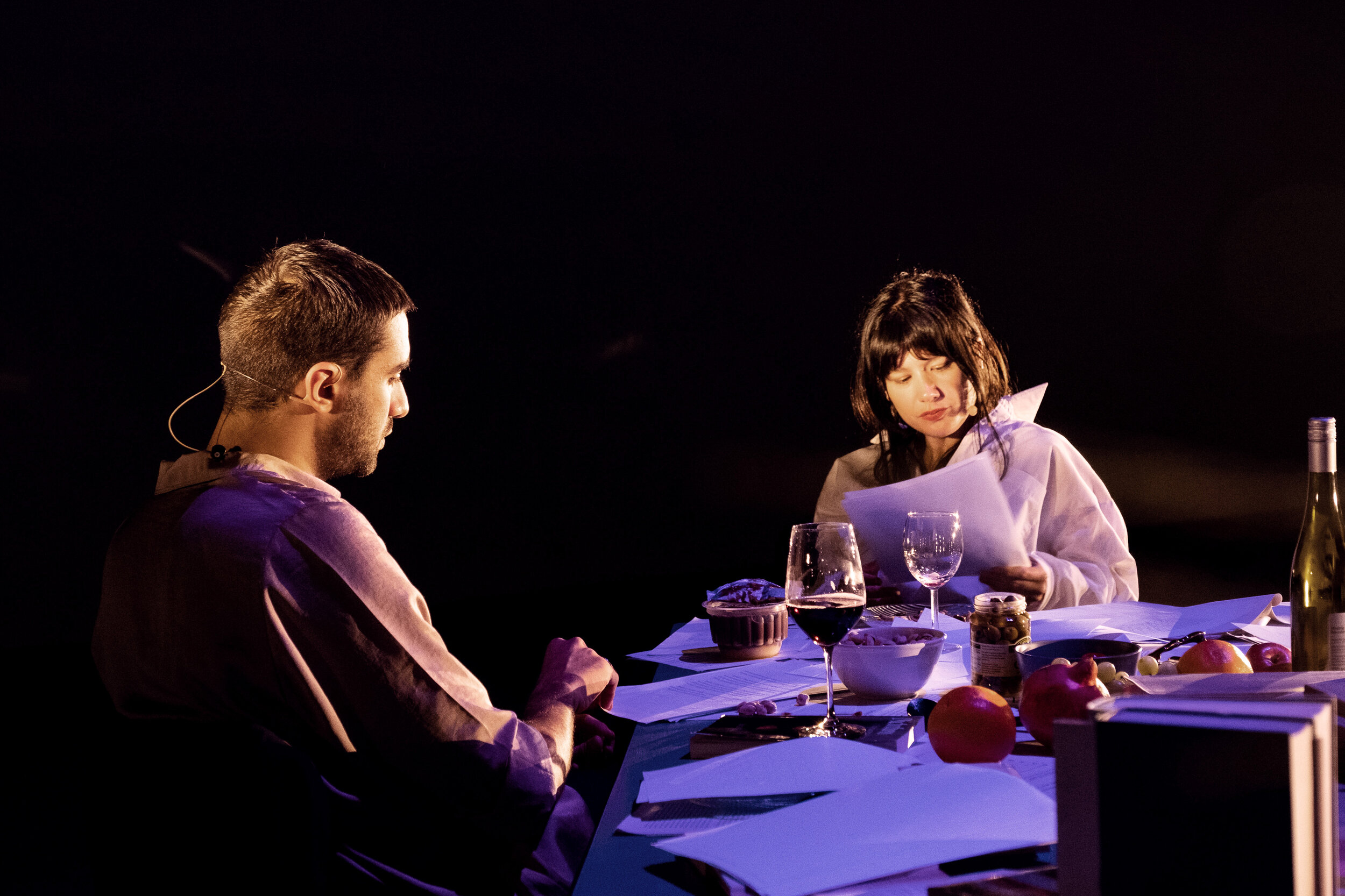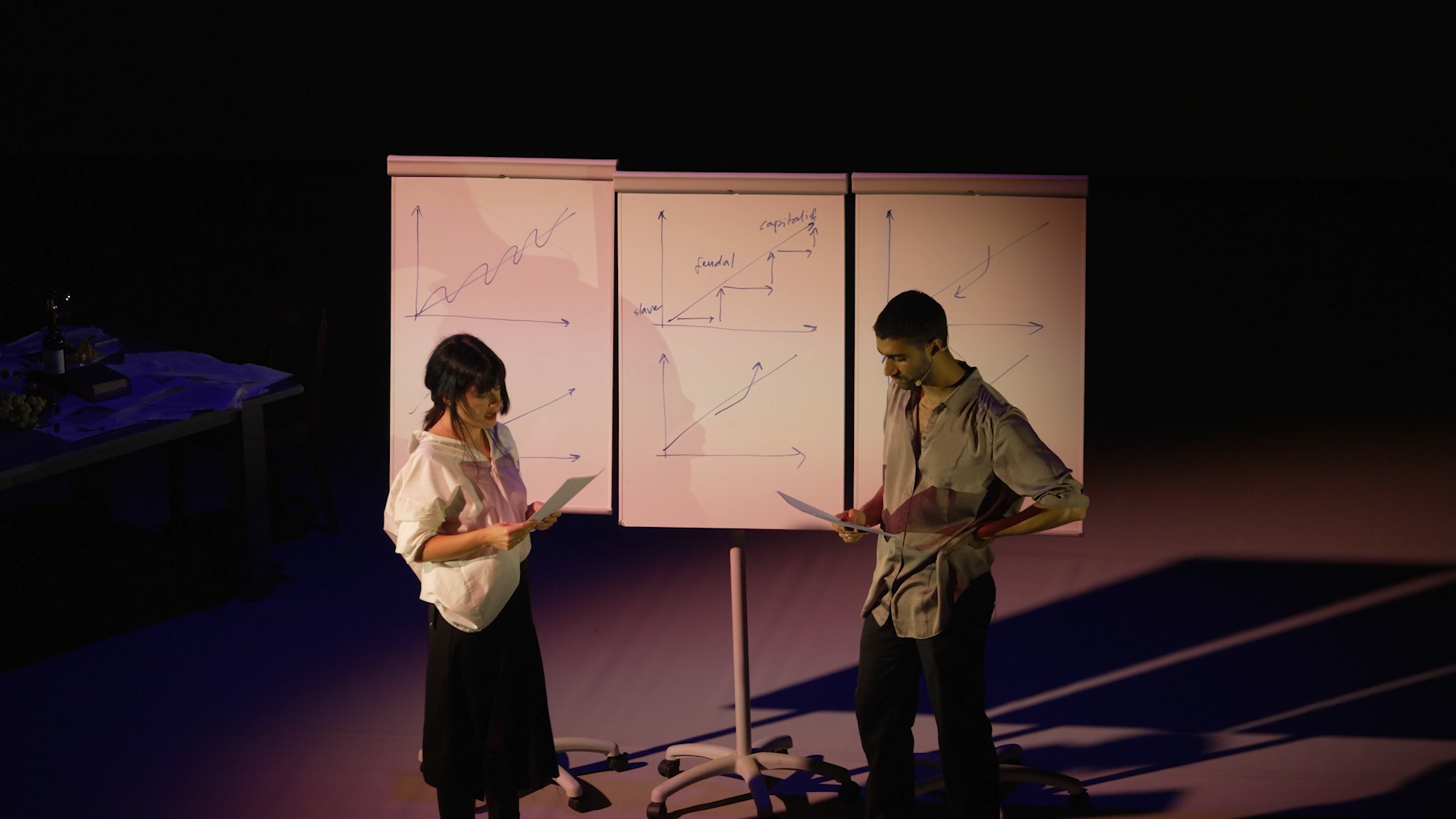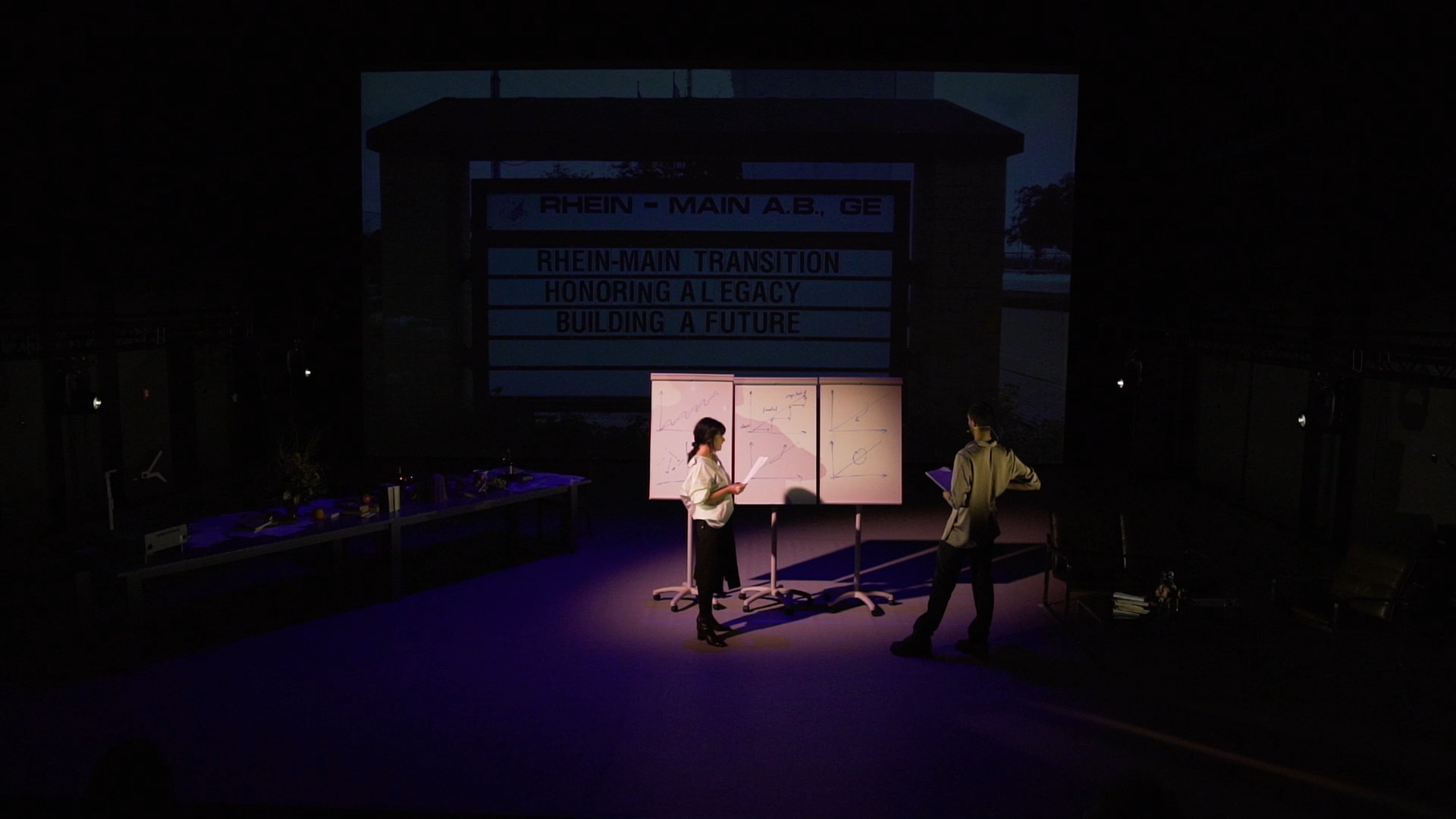In Permanent Trespass (Beirut of the Balkans and the American Century), two traveling eulogists meet on a dire tableau: something like our contemporary moment or crumbling epoch. First-person monologues oscillate between formal registers towards a performance within a performance, that of a commissioned funerary text. Who or what is being mourned against a backdrop of incommensurate cruelty? Fantasized digressions hint at jumps in time toward revolution forever deferred.
_____
EXCERPT:
Eulogists Talk Shop / Professional Mourning
[EULOGIST 1 and EULOGIST 2 sit on a white couch, uncomfortably close. The two begin “talking shop”; they are traveling eulogists sharing occupational inspirations and resentments.]
EULOGIST 1: It says here that everything must go! Every single sofa, armchair, piano, manifesto, every airborne pamphlet, leaflet, booklet, novella, and operetta. It’s a kind of …clearance sale on language itself… but I don’t know, or I’m not sure, I am still jet lagged. You’re here for the ceremony too?
EULOGIST 2: Yes, I’m the traveling eulogist. They didn’t tell me it was also an estate sale. Had I known, I would never have come. I’m very superstitious, and certain kinds of death are contagious—
EULOGIST 1: Beware the opaque contract. I learned that a long time ago, yet here I am. [pause] I’m charmed that you retain taboos — cynicism is the real occupational hazard in our line of work. How was your hotel room?
EULOGIST 2: Terrible. They always are! It's one provincial town after the other, barely a hotel between them. God forbid someone dies in proximity to a Hilton. In the presence of death, one imagines dignity and manners: scentless flowers and sorrowful expressions, temperate weather, thick linen napkins. Instead, there is barely time to shut the eye of the cadaver —in come the auctioneers and lawyers!
EULOGIST 1: You would’ve been better off an auctioneer, I mean at least better compensated.
EULOGIST 2: Too late to retrain. And the illusions we’re commissioned for are comparatively benign, morally insignificant. What I mean is, I can live with it. In fact, I can pitch an excuse for it! “What human need can be more profound than to humanize the common death?” [gets up] Have you seen this film, Asthenic Syndrome? I watch it before every funeral since it opens with one. The woman who is grieving—whose deceased husband bears more than a passing resemblance to Stalin—is disturbed and then infuriated by two men who appear to be having a casual conversation. Laughter echoes and reverberates contempt and indifference.
EULOGIST 1: But grief makes us unstable, unreliable witnesses. I’ve heard numerous stories of laughter at funerals, even by the most intimately bereaved—what if the laughing men were indeed morose?
EULOGIST 2: No, the men were insolent. You can’t just throw a body into the earth; there are codes and ceremonies, and that is what we’re here to practice! Anyway. It was 1989. The “short-twentieth century” was over. The question was how to contain loss-ness. And our question?
EULOGIST 1: Everything is always being settled at this very moment; it feels like a simmering that will never boil over. I find myself wishing that it would finally boil over.
EULOGIST 2: Enough catastrophism! You have to make the best use of the minibar.
EULOGIST 1: Oh, the minibar. Another casualty of our era. They’ve put me in an Airbnb. Does it feel like everything has been downgraded? [pause, shuffling around the stage]
What does it say that your preparatory notes are obscure cinema? I always return to The Arab Dream—I mean the operetta, not the pan-nationalist dream itself. The operetta was basically a long music video with the biggest Arab pop stars of the time that played on TV across the Arab world during the Second Palestinian Intifada. It contained horrific archival footage, starting with the first Palestinian expulsion through the rise and fall of Jamal Abdel Nasser, complete with wailing women after every massacre.
What was being mourned remains unclear: the loss of Arab unity, the loss of a Palestinian home, or, more so, the loss of the pan-Arabist father who knows. The wailing women were put in the service of this ill-defined mourning.
EULOGIST 2: Making meaning out of something that makes no sense is betrayal or an art, or simply life itself. In a professional eulogy, you bring death once again to the market; you make one more paper trail for that life. In a courtroom, in a murder trial…
EULOGIST 1: Whoa, whoa! You’re getting ahead of yourself.
EULOGIST 2: Sorry! In my attempt at stepping over my own feet, I end up tripping and falling.
EULOGIST 1: Yes, you do. But go on.
EULOGIST 2: In a courtroom, in a murder trial, you return the deaths to the law; you say they don’t belong on the trading room floor. But they do belong on the trading room floor. It’s a question of honesty.
EULOGIST 1: [mockingly] Oh, honesty?
EULOGIST 2: Yes, honesty!
EULOGIST 1: I suppose. I am rarely “honest” when speaking of the dead, but I am honest when asking for my salary.
EULOGIST 2: Okay, okay, I get it: us, the vulgar materialists.
Now! This is more a question of professional practice, almost a technicality: in your speeches, do you still include the dates?
EULOGIST 1: The dates?
EULOGIST 2: The dates. Like the landmark years, milestones, …
EULOGIST 1: [assuredly, abruptly] Oh, I’ve stopped.
EULOGIST 2: [in vigorous agreement, shaking head] I’ve stopped as well. The searching quality gets so tedious after a certain point: 1945 this, 1948 that, 1968 that, 1967 that, 2023… this.
EULOGIST 1: I’ve always preferred a more strictly virtuosic narration. Cause and effect are—by definition—consequential, but do you absolutely have to know when someone’s husband was ransomed off, [Side lighting dim QUICKLY and fully] when the flood took everything, when Yasser Arafat had his firstborn and only child?
_____
Written by Sanja Grozdanić and Bassem Saad
Performed at:
- Live Works 11 - Centrale Fies / Dro, Italy / July 2023
- Reenactment Symposium / Stroom, The Hague, NL / October 2022
- Sunflower Theate, Beirut, LB / December 2021
- Künstlerhaus Mousonturm / Frankfurt / September 2021
First commissioned as part This is Not Lebanon Festival, curated by Matthias Lilienthal, Rabih Mroué, Anna Wagner, Christine Tohme.
Images from Centrale Fies performance below by Alessandro Sala.

